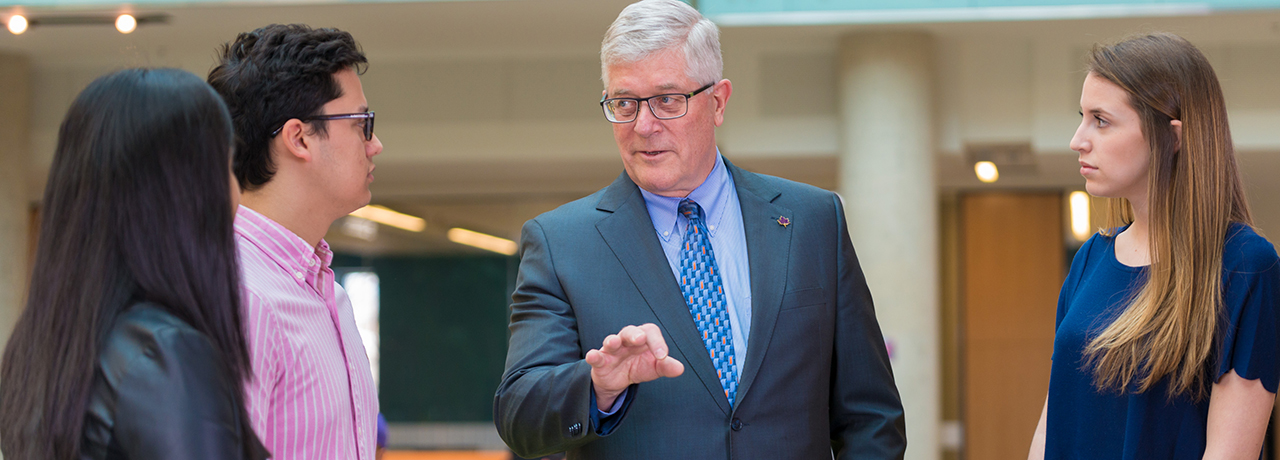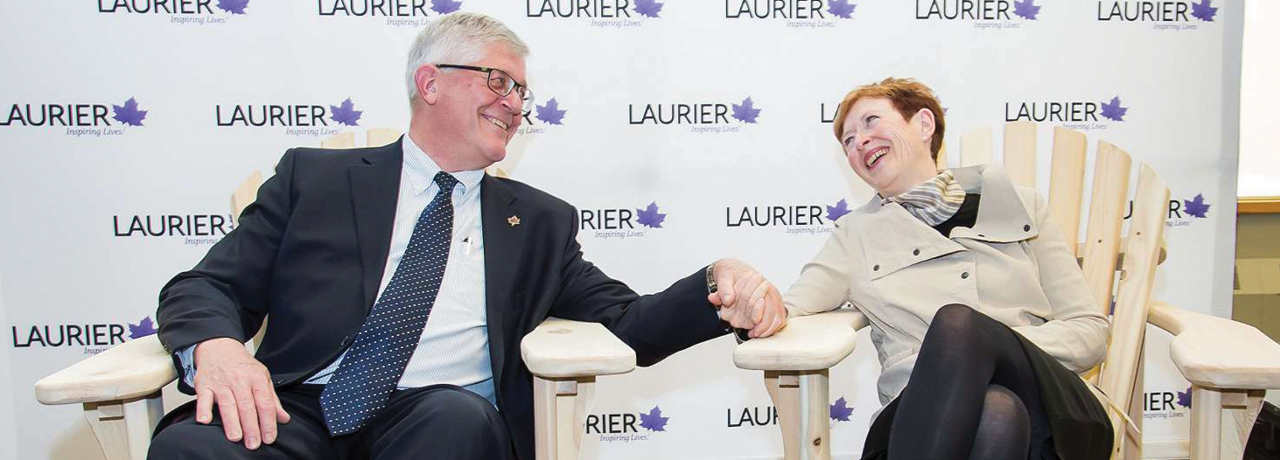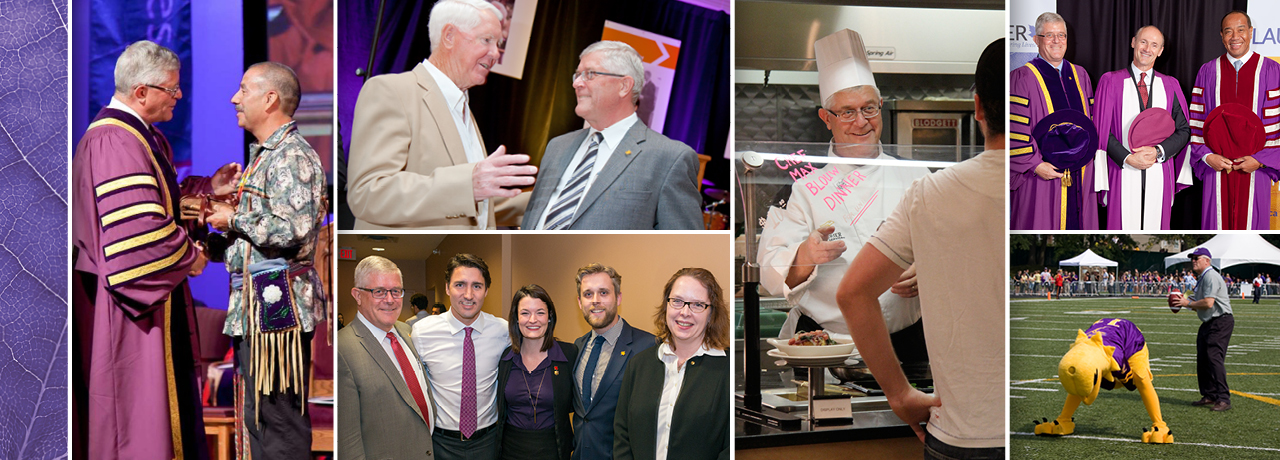Photography by John Ternan
Max Blouw believes it is important to define what an organization aspires to be, so it was no surprise that his first major initiative as president of Laurier was to lead the university in doing just that.
"My impression was that Laurier was a wonderful place that really didn’t have a clear sense of where it was going,” Blouw recalls of his arrival 10 years ago. “The university was spilling out over its boundaries in Waterloo, it had expanded to Kitchener and Brantford.
“I thought it was very important to ask ourselves the questions: Who are we? What do we care about? And, as we look forward, what do we want to be?”

The collaborative exercise he initiated, called Envisioning Laurier, was designed to identify and articulate the university’s values, mission and guiding principles, providing the foundation for growth during Blouw’s decade as president and many years beyond.
Forming a concrete vision for Laurier’s future is just one of many accomplishments Blouw can take pride in as his second term as president and vice-chancellor comes to an end June 30. His tenure has also seen the construction of Lazaridis Hall and the Centre for Cold Regions and Water Science in Waterloo, extensive growth at the university’s Brantford campus, increased research in departments across the university and a move to explore the possibility of a new Laurier campus in Milton.
“He’ll be remembered for building Laurier’s presence and impact on the whole university system, as well as its reputation overall,” says David McMurray, Laurier’s vice-president of student affairs. “He helped create a multi-campus institution that’s grown tremendously, which students still say is a closely connected, intimate, caring community.”
Blouw’s initiative to explore a new Laurier campus in Milton is arguably his greatest legacy. It’s an undertaking he began in 2008 and one that will continue under Laurier’s next president, Deborah MacLatchy.
“There’s an opportunity in Milton to secure growth,” Blouw says. “At a time when other institutions will be struggling to achieve growth, we have an opportunity to grow. We also have the opportunity for academic complementarity, to enrich and broaden academic offerings and to give students more choice.
"I think it's a model that actually speaks to the future of education: flexibility for students, education close to home and very much responsive to the needs of employers and communities.”
With Laurier growing in new locations, Blouw believed all voices needed to be heard as part of the university’s governance structure. Early in his first term, he created a task force to develop “consensus points” that would provide the principles for governing a multi-campus, multi-community university, a model that became known as “multi-campus governance.”
“When I arrived there really wasn’t a clear governance model in a multi-campus context,” Blouw says. “I think one of the most important things that came out of the multi-campus governance review was very clear and scalable principles that can be applied to the university as it moves potentially to Milton, as Brantford grows, and as other campuses may grow.”
Beverly Harris, a former chair of Laurier’s board of governors who headed the search committee that led to Blouw’s hiring, notes the importance of Blouw working to adopt a multi-campus governance model. “Not only was he a skilled university administrator, but he had a real sense of the role of good governance in the success of a university,” Harris recalls.
As it approaches its 20th anniversary in 2019, Laurier’s Brantford campus has continued its rapid expansion. Blouw’s term as president has seen the opening of the Research and Academic Centre, the start of construction of a new Laurier-YMCA athletics and recreation facility and the purchase of the Market Square building, all in downtown Brantford. As well, two new faculties were created at the Brantford campus and new academic programs introduced.
“I’m delighted with the growth in Brantford,” Blouw says. “Not only do we have the fundamental humanities and social sciences, but we also have social work, journalism, criminology and law and society. These are all the applications of social sciences and humanities in a way that is highly relevant to the region and to the community.”
Brant MPP Dave Levac, a Laurier alumnus (BA '76) who serves as Speaker of the Legislative Assembly of Ontario, has worked with Blouw on matters pertaining to the Brantford campus for the past decade. He says Blouw’s vision of incorporating the community into the life of the university has led to great change.
“Max provided a thoughtful, pragmatic approach with a vision for the future and brought a whole different way of looking at a university’s participation in the community,” Levac says. “The obvious change for me is the development and resurrection of downtown Brantford. Laurier’s presence has made a huge impact.”
While there has been tremendous growth during the past decade, Blouw says Laurier’s identity remains intact.
“The Brantford campus is different than the Waterloo campus, the Waterloo campus is different than the Kitchener campus and a potential Milton campus would be different again,” he says. “Yet it’s all identifiably and very clearly Laurier. What is that identity that transcends geography? For me, it’s all about the student experience, the sense of community, the academic identities that we have.”

From his first day on the job, Blouw sought to increase research capacity and expand graduate studies at Laurier. To aid in this goal, he created the role of vice president: research. “Part of what I did was to say ‘research is important, let’s get a VP research, let’s get a strategic research plan that focuses on pillars of excellence we can achieve.’ Laurier is well-positioned because we have been paying attention to these things.”
Perhaps no facility is as representative of Laurier’s renewed focus on research as the Centre for Cold Regions and Water Science, which is visible from the window of Blouw’s Regina Street office. He sees the facility, which opened in 2013, as playing an important role in addressing pressing environmental issues through partnerships with governments and other academic institutions.
“This lab to me is very symbolic of a huge need, a very pressing need, not only for Canada but globally,” Blouw says. “I think the project represents real creativity, real imagination, real energy. And I believe the building and the work that goes on in there is representative of a new Laurier, a new approach that reflects the comprehensive status of the university.”
Blouw’s focus on research comes as no surprise to those who have worked with him during the past 10 years. He is interested in “evidence-based decision-making,” an approach he encouraged those around him to take whenever making the case for additional resources or new programming.
One of the most visible changes to occur during Blouw’s presidency is the construction of Lazaridis Hall on University Avenue in Waterloo. The state-of-the-art building is home to Laurier’s Lazaridis School of Business and Economics – which includes the Lazaridis Institute for the Management of Technology Enterprises and Schlegel Centre for Entrepreneurship and Social Innovation – as well as Laurier’s Department of Mathematics. A $20-million donation from BlackBerry founder Mike Lazaridis helped make the project possible.
Among many other accomplishments were the adoption of a new university-wide budgeting process, the establishment of a more focused government-relations program and a continued focus on student experience.
David McMurray, vice-president of student affairs at Laurier, has worked closely with Blouw over the past 10 years. He recalls his first meeting with the new president, lunch at Wilf’s shortly after Blouw arrived at the university. The meeting was scheduled to last 40 minutes.
“We were there for over two hours,” McMurray recalls. “He was so keen on learning about the student experience here at Laurier. We developed a close relationship as a result of that focus.”
Indeed, Blouw enjoys spending time with students and has always made time in his busy schedule for regular meetings with student leaders. Olivia Matthews served as Laurier’s student union president during the 2015-2016 academic year, a role that saw her often working with Blouw. She says they shared a positive working relationship.
“I remember he started off on a great note,” Matthews recalls. “He said, ‘We’re not always going to agree on everything and that’s okay.’ He gave me the autonomy to represent the students but also gave me his ear from an in-the-know perspective.”
Marc Richardson, current president of Laurier’s alumni association, noted that Blouw has been exceedingly generous with his time. “Any time we wanted to have him speak at our board he would come and spend an hour,” Richardson says. “When I think back about the relationship, he was always committed to being around when we wanted. He always seemed to make the time.”

Those who work with Blouw say he is unflappable, even-keeled and respectful no matter how tense a situation gets. They also note he is at ease with everyone, from billionaires, prime ministers and renowned scholars to students, staff and parents. These are qualities that have served him well throughout a distinguished career.
Blouw enjoyed a more than 30-year career in academics before arriving at Laurier. A biologist, he began teaching at St. Francis Xavier University in 1984. A decade later, he moved to the University of Northern British Columbia, attracted there by the school’s progressive research environment. In 1997, Blouw was appointed to lead the research office at UNBC.
Blouw remained at UNBC until his appointment to Laurier in 2007. He and wife Lynn, also a biologist, made the move from Prince George, B.C. to a country property just outside of Waterloo, a location that reflects the Blouws’ love of the outdoors. The home is a place Richardson and many others in the Laurier community have visited often, with Blouw delighting in taking his visitors on guided walks around the acreage.
“Max and Lynn are very caring and very family oriented,” Richardson says. “He would always ask about our family and showed a genuine interest in what you were doing outside of Laurier.”
Beverly Harris notes the important role Lynn has played during her husband’s time as president.
“During the last 10 years, Lynn served as a partner in the enterprise of the university and brought another element to Max’s presidency that I think was very important,” Harris says. “She brought a real energy to it and a genuine interest in the people she met. There was a real warmth to her contribution.”
While Blouw presided over milestone events during his time as president – Laurier’s centennial in 2011 and co-hosting the Congress of the Humanities and Social Sciences in 2012 among them – he says one annual event stands out for him.
“Homecoming consistently reaffirms the reason that Laurier is such a great institution,” Blouw says. “People are so deeply connected, they are so committed to the community that is the university. I find it really heartwarming.”
As for what comes next, Blouw says he’s weighing his options. One certainty, though, is that he and Lynn will remain close to Waterloo Region, an area they have come to love.
“I’m going to be a little bit fussy about what I do next,” Blouw says. “I’ve been working extremely hard for many years, certainly here at Laurier but also before that. I will look forward to being a little more in control of my own time and my own agenda. But I will miss the university desperately. I just love the place and I love the job.”
Certainly, the Laurier community will also miss Blouw.
“It was a real pleasure and a privilege to work with Max,” Harris says. “I hope that people look back and see his presidency as a time that Laurier gained a real sense of itself, a place that had a real direction and an even greater pride.”
